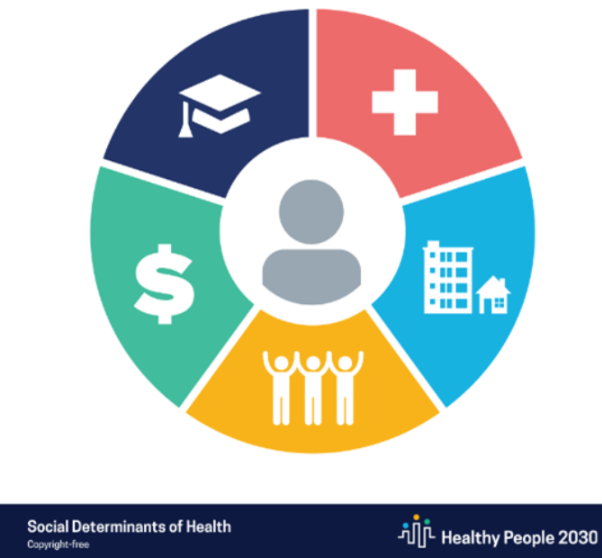What’s Public Health Got To Do With… Using Data to Address Social Determinants of Health

By Megan Wolfe, JD Senior Policy Development Manager, Trust for America’s Health & Karon Phillips Policy Development Manager, Trust for America’s Health

So far this year, Trust for America’s Health’s Age-Friendly Public Health Systems training series has focused on the public health roles in addressing social determinants of health, and we’ve proposed some new areas to think about as social determinants, such as technology. Typically, we think of social determinants as the conditions and environments in which people are born, live, learn, work, play, worship, and age that affect a wide range of health, functioning, and quality-of-life outcomes and risks. There is a common understanding that social determinants may influence 80 percent of a person’s health status. So, they are really important to factor into a community’s health protection and promotion strategies.
Data can be a catalyst for improving community health and well-being. Understanding data on social determinants of health, such as income, education level, and employment, can help target resources and interventions to make communities more conducive to healthy living. Data is crucial to understanding health disparities and developing health equity strategies. TFAH has been working with several state departments of health to facilitate the development and dissemination of healthy aging profiles, and we provide examples of the profiles, sites, and sources of data in this blog.
“In Mississippi, the impact of healthy aging data profiles in addressing social determinants of health (SDOH) is described in four domains: Service Development, Collaboration, Education, and Advocacy. Access to quality and timely data is essential to public health actions. As we continue to address the health and well-being of older adults, understanding data such as income and health outcomes will be vital to improving community health.” – Dr. Kina White, Director, Office of Community Health Improvement
Examples
Florida: Aging in Florida Profiles are available for all 67 counties, and include data on population, family and living arrangements, education and financial status, and health status and behaviors
Massachusetts Health Aging Data Report and Community Profiles
Mississippi: Healthy Aging Profiles are under development
Washington: Older Adult Health Profiles provide data on older adult demographics, chronic conditions, falls, and other key issues for all counties in the state. For access to the profiles, please contact Marci Getz at marci.getz@doh.wa.gov
“Access to healthy aging data has allowed the Washington State Department of Health and our partners to understand the health challenges facing older adults living in both rural and urban areas of our state. The data is used to determine priority areas to focus on, to plan strategically, and to support applications for funding. Having specific county level data on the projected growth of the older adult population, levels of cognitive and functional impairment, as well as the current levels of chronic diseases, falls, and emergency room visits allows us to identify action steps.” – Marci Getz, Director – Health Aging Initiatives
Data Sources
Chronic Disease Indicators enable public health professionals and policy makers to retrieve state and selected metropolitan-level data for chronic diseases and risk factors, including overarching conditions that are SDOH.
Compendium of Federal Data Sets Addressing Health Disparities is an initiative of the Interdepartmental Health Equity Collaborative (IHEC) and the HHS Office of Minority Health to encourage intersectoral collaboration across federal agencies to better address health disparities.
Disability and Health Data Systems an online source of state-level data on adults with disabilities helps users access information on six functional disability types: cognitive, hearing, mobility, vision, self-care, and independent living.
Social Vulnerability Index uses U.S. Census variables at tract level to help local officials identify communities that may need support in preparing for hazards or recovering from disaster.
University of Michigan National Poll on Healthy Aging is nationally representative survey that contains data on issues relate to health, healthcare, and health policy affecting adults age 50-80 and their families.
Vulnerable Populations Footprint Tool creates maps and reports that identify geographic areas with high poverty rates and low education levels – two key social determinant indicators of population health.